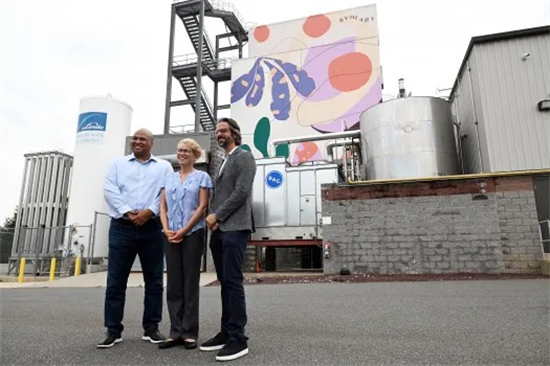Congresswoman visits Berks baby formula plant to discuss supply chain protection
Reading,
July 19, 2024
Originally published in Reading Eagle. Back in 2022, in the midst of the COVID-19 pandemic, that’s exactly what fearful and frustrated parents saw. The U.S. was facing a severe baby formula shortage, one that saw out-of-stock rates reach 70%. It was caused in part by the same supply chain disruption that impacted all sorts of other products. And it was blown into a crisis by a major recall and plant shutdown that February by manufacturer Abbott Laboratories following the deaths of two children due to bacterial infections. The closure of a plant was a major blow to the industry, particularly because so few companies produce baby formula. Just three companies are responsible for making about 90% of the formula found on shelves across the nation. The shortage has come and gone, and the media spotlight that focused so brightly on it at the time has turned away from the topic. But that doesn’t mean the factors that led to the shortage have vanished. U.S. Rep. Chrissy Houlahan is trying to do something about that. “It wasn’t long ago that the infant formula crisis had parents across America worried about meeting their babies’ nutritional needs,” the Chester County Democrat who also represents part of Berks County said in a statement released earlier this week. “While that immediate concern has abated, we must address weaknesses in our supply chain to ensure we never find ourselves with empty shelves and hungry babies again.” Houlahan’s statement announced that she and Rep. Zach Nunn, an Indiana Republican, had introduced bipartisan legislation aimed at expanding and diversifying the baby formula supply chain by supporting small-sized manufacturers based in the United States. And on Thursday, the congresswoman stopped by one of those manufacturers to promote the Investing in New Families and Newborns Through (INFANT) Tax Credit Act. She visited and toured the ByHeart plant in Exeter Township. Speaking with the media before embarking on her tour, Houlahan stressed the importance of addressing baby formula supply chain issues. “We all remember we had a really big crisis when we didn’t have enough formula for the country,” she said. “We haven’t forgotten about that critical time.” Houlahan said that for some infants formula is their sole food source, which means the idea of it not being readily available is unacceptable. Her bill, she said, would help to prevent that type of situation from ever arising again. The legislation would create a tax credit program that she believes would promote competition, sustain production growth and ensure greater access to infant formula options for families nationwide. Houlahan said that producing baby formula, like any sort of manufacturing, is a tough businesses to break into. Formula is the most highly-regulated food in the country, which creates costly barriers to entering the market. “We need more pathways for more than just a couple of manufacturers to exists,” she said. By providing a financial incentive in the form of a tax credit, Houlahan said, those barriers can be eased. And, hopefully, that will lead to more producers and a supply chain that is more robust with multiple fail safes, she said. Ron Belldegrun, CEO and cofounder of ByHeart, echoed the congresswoman’s sentiment. “In 2022, I think we underwent what I think was the biggest food risk we’ve ever had in America,” he said. He agreed that there are far too few baby formula manufacturers in the U.S., saying that has made the supply chain concentrated and fragile. He pointed out that when the ByHeart plant in Exeter was first opened in 2022 it was the first new plant in the U.S. in 15 years. “With this bill, hopefully we don’t have to wait 15 years for another one,” he said. Belldegrun said that entering the baby formula market is, indeed, difficult. Regulations from the U.S. Food and Drug Administration mean that introducing a new product typically takes five or six years, which means any sort of profits will take a while to roll in. And, Belldegrun said, by not having new players appearing on the scene, innovation and advancement in the product suffer. “We need to continue to drive new research, new discovery and better formulas,” he said. “And that’s important, because this serves as the foundation for future health.” |
In the News



